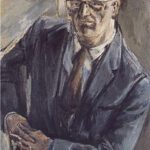Born in Cardiff, the Welsh poet-priest R.S. Thomas (1913 – 2000) wrote hundreds of reflective poems of sensitivity and intelligence from the 1960’s on, but his far more memorable and distinctive work comes out of the 1940s and ‘50s in a mode of “stark naturalism”—to use a phrase from one of Thomas’s poems—depicting the often […]
C.H. Sisson: Cerberus at the Gates of Hell
Though now little noticed, the British writer C.H. Sisson (1914 – 2003) is a poet worth studying for the force and vigor of a handful of fine poems, especially those derived from classical sources. Not to be confused with the Sasson, a poet of the First World War, C. H. Sisson was 40 when he […]
A.R. Ammons on “Conserving the Magnitude of Uselessness”
Handstands through the Universe In an interview, A.R. Ammons mentions “Conserving the Magnitude of Uselessness” as a poem he considered, along with “If Anything Will Level with You Water Will,” among his two best. “Casadilla Falls” or “Corsons Inlet” are easier poems, surely, but “Conserving the Magnitude” is a marvel of invention, behaving at first […]
Berryman’s Sad Wild Riffs: Dream Songs 37, 38, and 39
Idioms and Slang in Three of John Berryman’s 77 Dream Songs In John Berryman’s Dream Songs 37, 38, and 39, the expressive idioms and delectable slang characteristic of the Songs as a whole render moving and memorable this farewell to Robert Frost. 77 Dream Songs The central character of 77 Dream Songs is Henry, who, […]
The Rich Harmonies of Schnackenberg’s Kremlin of Smoke
As full of “luxuriant ornamentation”[1] as a Frederik Chopin Mazurka or Nocturne, Gjertrud Schnackenberg’s eight-poem sequence from her 1985 book, The Lamplit Answer, is both tribute to Chopin’s music and mimicry of his aesthetic. With her strong poetic personality and unmistakable verse topography, it’s no surprise Schnackenberg is drawn to Chopin’s own singular and distinctive […]
Visions & Affiliations: Jack Foley’s California Time Line
Jack Kerouac coined the phrased “Beat Generation” in 1948, the year Jack Foley opens his chronology of West Coast poetry, his rich syllabus of literary, political, and sociological texts that define a bygone era. Nineteen-forty-eight was seminal in other ways, as well, announcing the publication of Kinsey’s Sexual Behavior in the Human Male and Ezra Pound’s Pisan Cantos (New Directions). T.S. Eliot won the Nobel Prize, Denise Levertov emigrated to the U.S., and William Everson, whose The Residual Years was newly published, became Brother Antoninus after speaking with God. The following year, Marcel Duchamp lectured at the SF Museum of Art and the Hungary i opened. A new radio station, KPFA, began broadcasting Jarmie de Angulo’s Indian Tales. DH Lawrence came out with his Selected Poems (New Directions), with an introduction by Kenneth Rexroth, who took the metrics of Hopkins and Bridges to task, and dismissed the idealized, stilted ways of writing of old masters like Thomas Hardy and Matthew Arnold. “Sermonizing,” he called it.

